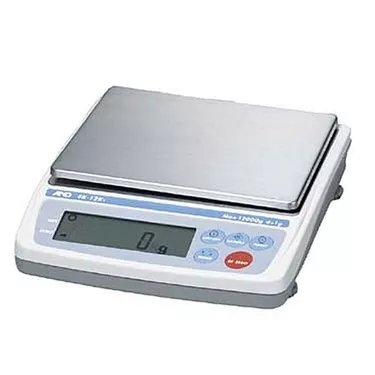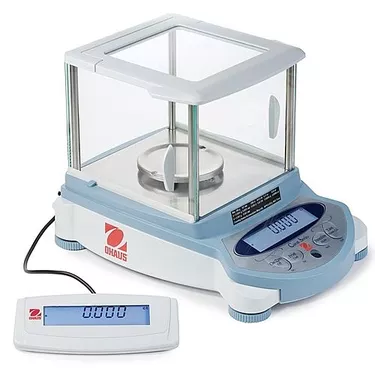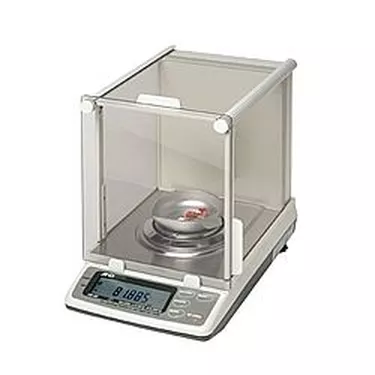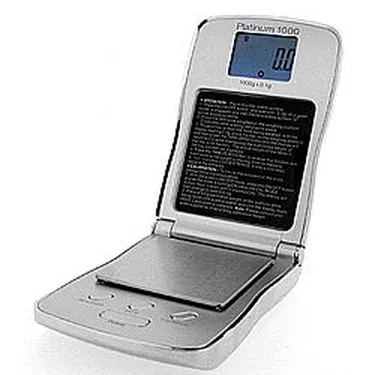
If you're going to have a gold party, or if you'd like to buy and sell gold or jewelry, there are several essential items you'll need. One of them is a jewelry scale, and in this article I'll tell you what you need to choose the right one. Also check out www.iGem.com for a good selection of jewelry, gem or gold scales.
Step 1

Know Which Weighing Units (g, oz., ct, grains, cwt, oz) You'll Be Using: Consider which weighing units and the items that you intend to weigh the best. Weighing units, such as grams (g), Troy ounces (oz.), grains, Pennyweight (dwt), or (ounces) oz. Grams and ounces are the most common weighing units for precision scales, but some precision scales also offer the weighing units of Carats - ct (used for stones and gems) Troy Ounces - dwt (used for some precious metals) and Grains - gn (used for gunpowder).
Video of the Day
If you are looking to weigh in milligrams (mg) you will find that most scales only display in grams, and 0.001g = 1mg or 0.01g = 10mg. You will also see the term TCW, which means "Total Carat Weight." The term TCW refers to the TOTAL weight of ALL stones in one piece of jewelry or pair of earrings.
Step 2

Make Sure You Know Your Local/Federal Government Requirements:
Depending on your local government's requirements, you may need to invest in a scale that has been approved for use in retail trade. In the USA, a scale that has been NTEP Approved will mostly likely be Legal for Trade. You should check with your local authorities to determine what requirements and/or approvals your scale may need to be legal for trade.
NTEP Approved scales are generally considered those scales which are intended by the manufacturer for use in commercial applications where products are sold by weight. NTEP Approved is also known as Legal for Trade or complies with Handbook 44. While the definition of commercial applications may vary slightly among different weights and measures jurisdictions, NIST Handbook 44 (General Code paragraph G-A.1.) and NIST Handbook 130 (Uniform Weights and Measures Law, Section 1.13.) define Commercial Weighing and Measuring Equipment as follows: ".....weights and measures and weighing and measuring devices commercially used or employed in establishing the size, quantity, extent, area, or measurement of quantities, things, produce, or articles for distribution or consumption, purchased, offered, or submitted for sale, hire, or award, or in computing any basic charge or payment for services rendered on the basis of weight or measure."
All State weights and measures jurisdictions have adopted Handbook 44, so, except in instances where an individual state has adopted more specific language to define the term "commercial," this general definition would apply. A scale that meets all requirements of NIST Handbook 44 and applicable state and local weights and measures requirements would be deemed to be suitable for "Legal for Trade" or commercial use.
Step 3

Know What Size and Portability You'll Need--Where Will You Use Your Scale?:
If you need to bring your scale with you to various locations, then you should select a scale that is compact & portable (i.e. pocket scale or mini scale). However, if you are placing your scale on a bench/table, then you may want to select a different sized precision scale. As you may have discovered, there is generally a direct relation between capacity and accuracy. The higher the accuracy of a scale, the scale will generally have a lower capacity. If you are looking for a digital scale with a high capacity and a high accuracy, this will most likely be very expensive.
Due to the lower prices, most gemstone collectors use a CARAT scale with an accuracy of 0.05ct (0.01g) and a capacity of 250ct or 500ct (50g or 100g). However, most professional dealers or collectors will use a CARAT scale with an accuracy of 0.01ct (0.001g) and capacities from 250ct to 1500ct (50g to 300g).
Once you have determined this information, you will simply need to select a precision scale that meets your capacity and accuracy requirements.
Step 4

Consider Capacity Versus Accuracy:
Before you purchase any scale, you will need to ask yourself about the minimum and maximum amounts you'll want to weigh depending upon what you're going to weigh. Here are more specific questions:
a) What is the maximum amount that you will ever need to weigh (i.e. 10g, 200dwt, 250ct, etc.)?
a) What is the minimum increment (i.e. smallest amount) you will measure (i.e. 1g or 0.01g, 0.05ct, etc.)?
A general relation between capacity and accuracy of scales tells us that the higher the accuracy of a scale, the lower its capacity will be; a digital scale with both high capacity and high accuracy will be rather expensive.
Due to the lower prices, most gemstone collectors use a CARAT scale with an accuracy of 0.05ct (0.01g) and a capacity of 250ct or 500ct (50g or 100g). However, most professional dealers or collectors will use a CARAT scale with an accuracy of 0.01ct (0.001g) and capacities from 250ct to 1500ct (50g to 300g).
After all this is done, you're ready to go and choose your scale. If you want to know more, check out http://www.igem.com/c-18-jewelry-scales.aspx or just go to iGem Instruments' website and click on the Jewelry Scales link--that'll give you an idea of a range of instruments that are offered, and we have very reasonable prices.
Good luck!
Tip
Legal for Trade balance scales will have a CofC number on them which can be used to pull up the actual document on the Dept. of Weights and Measures website describing the specific model you own or are planning to purchase. This document will also note whether its NTEP approval is for a certain mode or weighing unit. For example, a scale can have weighing specifications of 400 g x 0.01 g but is only legal for trade at 400 g x 0.1g. It is important to be aware of this before you purchase a balance to ensure the scale meets your weighing specifications. If you are caught not abiding by these laws your scale can be confiscated and you may also be fined. Check out www.iGem.com for quality, precision scales.
Warning
If you're going to use a Jewelry Scale for financial transactions, make sure it's deemed Legal for Trade! Otherwise you could face fines or punishment if you're not working within the guidelines of the local or federal government's guidelines on scales. Buy from reputable sellers.
Things You'll Need
Know your budget range.
Know your Local and Federal Laws and regulations (more about this will follow).
Video of the Day